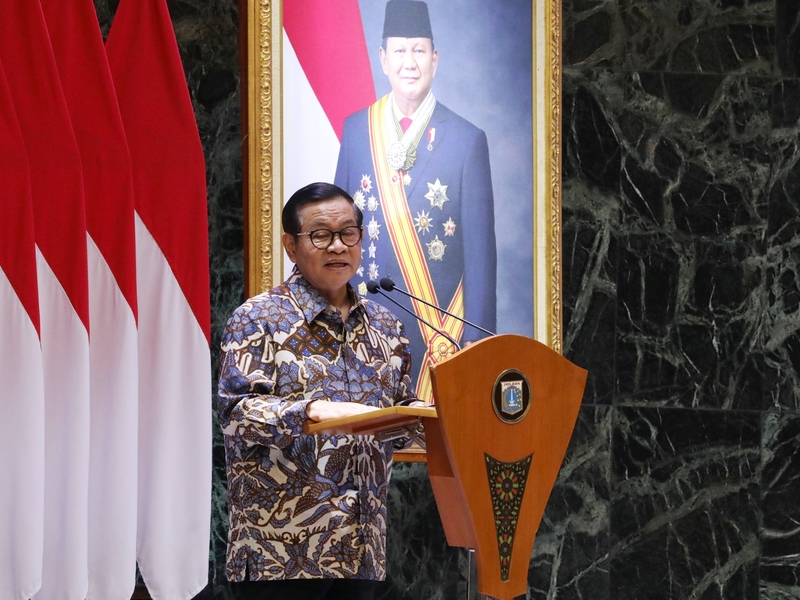

Friday, August 22nd 2025 Reporter: Dessy Suciati Translator: Nugroho Adibrata 279

(Foto: Mochamad Tresna Suheryanto)
Jakarta Governor, Pramono Anung, reaffirmed his commitment to making Betawi culture the main culture in the capital city, in accordance with the mandate of Law No. 2/2024.
To truly make Jakarta embody the Betawi identity, it must be done wholeheartedly
He expressed this statement at the cultural event 'Lestari Warisan Betawiku' at the Jakarta City Hall on Thursday (8/21).
"For me, the main challenge is how Betawi culture can truly grow and develop following Law Number 2/2024 and become the dominant culture in Jakarta," he expressed.
Despite he is from Java, Pramono emphasized that his administration will prioritize Betawi culture in Jakarta. He cited the example of the inauguration of echelon II officials, where they were required to wear a sarong, which is part of Betawi traditional clothing.
"To truly make Jakarta embody the Betawi identity, it must be done wholeheartedly," he continued.
To strengthen the Betawi culture and preserve its heritage, he mentioned that he will soon issue a Governor's Regulation regarding the Betawi Traditional Institution. Moreover, the Betawi tribe is the only tribe that does not have a traditional institution or council.
"Therefore, there must be customary institutions that regulate it," he explained.
Aside that, to honor the Betawi figures, he announced the Jakarta Government's plan to hold the Benyamin Sueb Award.
Further, he also mentioned batik, which has been recognized by UNESCO as Indonesia's Intangible Cultural Heritage since 2009.
As for the kebaya, four countries have registered the kebaya to become a UNESCO-recognized world heritage object, namely Indonesia, Malaysia, Brunei, and Singapore.
He also proposed the encim kebaya, a traditional Betawi kebaya, to be registered with UNESCO. He hopes that a decision regarding the encim kebaya proposal could be made soon.
"I propose the encim kebaya that is found in Betawi Jakarta because it is unlikely in Singapore and Malaysia, but the dominant one proposed is the encim kebaya," he explained.
Jakarta Kebaya Community Chairwoman, Happy Djarot, stated the cultural event 'Lestari Warisan Betawiku' is not only a celebration but also a tangible movement to preserve Indonesian culture.
This event was held by the Jakarta Kebaya Community under the auspices of the Jakarta Raya Bahagia Foundation to commemorate Indonesia's 80th Independence Day, Jakarta's 498th Anniversary, and the 2nd National Kebaya Day.
Through this event, the Kebaya Jakarta Community invites all layers of society to participate in preserving cultural heritage, especially Betawi culture, which is the identity of Jakarta.
"We want to demonstrate that cultural preservation is not only the responsibility of artists but also all residents. Hope this event will serve as a momentum to continue caring for and introducing Betawi culture to future generations," she explained.
With the support of the local government, the arts community, and community participation, 'Lestari Warisan Betawiku' is expected to become an annual event that is not only lively as a celebration but also has a tangible impact on the preservation of Indonesian culture.
This event showcases the richness of Betawi culture, including dance arts, lenong, traditional music, Betawi cuisine, and kebaya fashion shows as a symbol of Indonesian women's pride. In addition to displaying various Betawi arts and traditions, the event also pays tribute to cultural scholars and cultural centers.
"This support is expected to help them continue creating, inspiring, and becoming a fortress for preserving the nation's cultural traditions amidst the current of modernization," he explained.
Jakarta Kebaya Community is a platform for kebaya enthusiasts and culture preservers in Jakarta who are committed to maintaining the sustainability of kebaya and Indonesian culture through social, cultural, and educational activities.
Meanwhile, the Jakarta Raya Bahagia Foundation is an organization that oversees various social, cultural, and community empowerment activities in Jakarta, focusing on the preservation of cultural heritage and strengthening local identity amidst the development of the times.